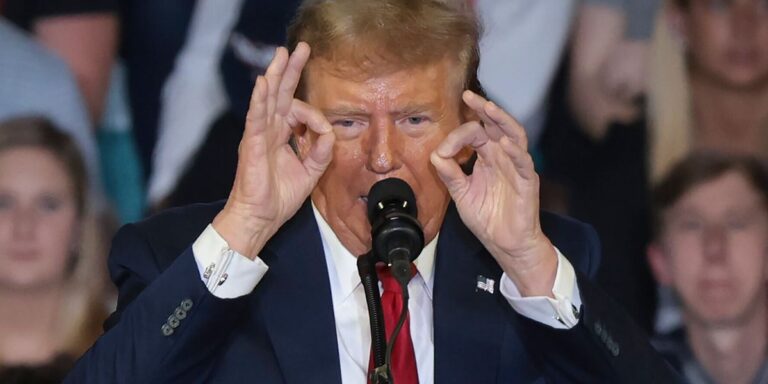
[ad_1]
Former President Donald Trump delivered an alarming message to U.S. allies during a Saturday rally where he outlined a scenario in which he would “encourage” Russia to “do whatever the hell they want” to other NATO members.
Speaking to a crowd in Conway, South Carolina, Trump told a story that cast himself as a tough-talking negotiator.
“NATO was busted until I came along,” he began. “I said, ‘Everybody’s going to pay.’ They said, ‘Well, if we don’t pay are you still going to protect us?’ I said, ‘Absolutely not.’ They couldn’t believe the answer.”
He rehashed the story a few moments later.
“One of the presidents of a big country stood up and said, ‘Well sir, if we don’t pay and we’re attacked by Russia, will you protect us?’ I said, ‘You didn’t pay? You’re delinquent?’ He said, ‘Yes, let’s say that happened.’ No, I would not protect you. In fact, I would encourage them to do whatever the hell they want,” Trump said.
“You gotta pay. You gotta pay your bills,” he added.
The audience cheered loudly for the former president, who is notorious for failing to pay bills on the campaign trailand in his past business endeavors.
It is not clear whether the scenario Trump described actually happened. Trump frequently takes credit for supposedly pressuring other NATO members into contributing more funding during the course of his first term.
But it’s a flawed claim.
Trump: One of the presidents of a big country stood up and said, Well, sir, if we don’t pay and were attacked by Russia, will you protect us? I said.. No I would not protect you. In fact, I would encourage them to do whatever the hell they want. pic.twitter.com/2RPVDFZIXy
— Acyn (@Acyn) February 10, 2024
As The Washington Postand other fact-checkers have noted, NATO member nations pledged to boost their funding over a period of 10 years at a 2014 summit held to address Russian aggression. Direct NATO funding has been increasing since then — although not at the pace needed to reach the goal set in 2014.
The alliance, however, is primarily strengthened through indirect funding, which is funding that member nations spend on their own individual militaries that could be called upon to assist the group if needed. NATO’s Article 5 states that member nations must treat an attack on one as an attack on all.
As of last year, Trump would not have the power as president to unilaterally withdraw the United States from NATO.
While he has made various comments about potentially doing so in the past, Congress passed legislation in December barring any president from withdrawing the U.S. from the organization without congressional cooperation.
The move came amid ongoing efforts by a far-right faction of Republicans to cut back or stop U.S. funding to Ukraine. The Eastern European nation, which is seeking NATO membership, has been fending off a Russian takeover for nearly two years.
On Saturday, Trump suggested the $95 billion aid package to Ukraine and Israel currently making its way through the Senate should instead take the form of a loan. He successfully pressured Republicans to kill a larger aid package that would also address U.S. immigration earlier this month.
Related…
[ad_2]